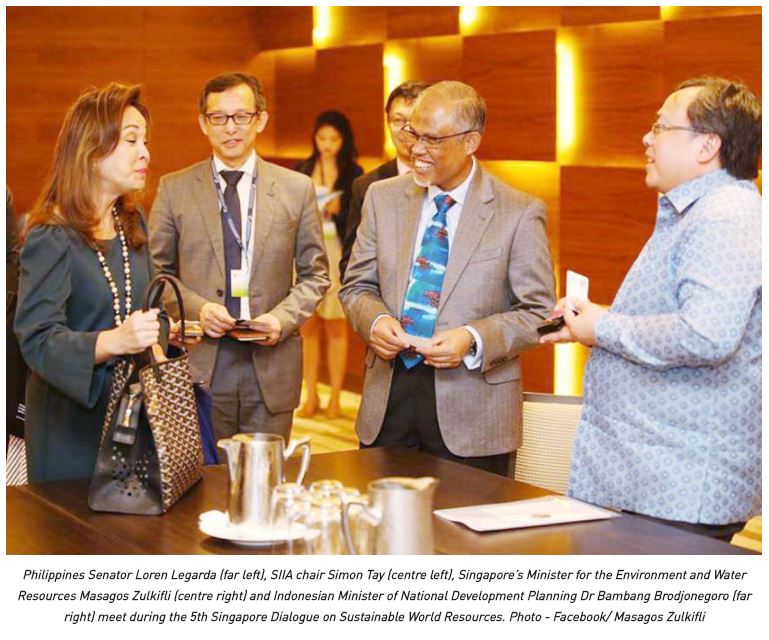From taxation to financing, ASEAN is gearing up for green growth
Member states of ASEAN are intensifying efforts to shift towards green growth, according to regional leaders and stakeholders who gathered for a sustainable conference in Singapore last month. Singapore is introducing a carbon tax to tackle greenhouse gas emissions, the Philippines is increasing its tax on imported coal by 15 times to US$3 per tonne, while Indonesia is aiming to reduce its emissions from transport, energy and forestry sectors.
This is a time when Myanmar is plunged into a national debate on electricity tariff reforms and soul-searching on which direction the country’s yet-to-be-announced economic policies should adopt. These environmental measures and policy efforts from different ASEAN countries serve as a timely reminder that taxes and regulations should take into account the environmental and social costs of different sectors.
The 5th Singapore Dialogue on Sustainable World Resources (SDSWR) was organised by the Singapore Institute of International Affairs (SIIA) on May 18 at the Grand Hyatt Singapore. This year’s Dialogue is themed “Climate Action: Seeding Green Growth and Resilience in ASEAN”.
As climate change worsens, ASEAN economies are increasingly adopting green growth and taking into account the environmental implications when pursuing economic growth, according to the SIIA. Governments across the region are taking steps to balance economic growth with responsible sectoral and regional planning.
Simon Tay, SIIA chair, said that Singapore seeks to promote green changes to the financing and supply chain developments in ASEAN. As the Paris agreement is increasingly setting the contexts for the fight against climate change, ASEAN, he argued, will be “the most effective region in the world” in terms of sustainability.
The responsibilities and role of companies are shifting towards greener options, but this does not only apply to those operating in western markets. In fact, many ASEAN-based companies are also responding to calls for greater transparency and sustainability. ASEAN is home to a lot of raw materials and is therefore crucial for the global supply chain.
“The theme for Singapore’s chairmanship of ASEAN is resilience and innovation. Among our key priorities is the need to address climate change,” Masagos Zulklfli, Singapore’s Minister for Environment and Water Resources, said in his keynote speech. Speakers stressed that the city state is leading partnerships such as a Special ASEAN Ministerial Meeting on Climate Action in July 2018 and the creation of an ASEAN Smart Cities Network, which will build municipal capacity for sustainable urban development.
Dr Bambang Brodjonegoro, Indonesia’s Minister for National Development Planning, highlighted how his country is continuing to set ambitious targets for the reduction of greenhouse gas emissions. Indonesia has established a framework for managing its forests and peatland, and is now turning its attention to other large carbon emitters, such as the transport and energy sectors. Indonesia’s minister went on to say that, with the environmental measures and efforts at curbing fire now in place, the 2015 haze crisis would not repeat itself this year.
 The 5th Singapore Dialogue on Sustainable World Resources organised by the Singapore Institute of International Affairs. Photo – Facebook/ Singapore Institute of International Affairs
The 5th Singapore Dialogue on Sustainable World Resources organised by the Singapore Institute of International Affairs. Photo – Facebook/ Singapore Institute of International Affairs
“In the last few years, including this year, we did not have the haze that happened in 2015,” he observed.
Another speaker went even further.
“We consider fossil fuel as a thing of the past,” Senator Loren Legarda of the Philippines remarked. As chair of the Senate Committees on finance and climate change, she has pushed the government to harmonise energy, climate, agriculture and food policy with public and private financing.
For green growth to take off, businesses, the government and other stakeholders must be on board.
“It requires market, society and the government to come together to recognise the mutual drivers that will allow us to accelerate the pace towards decarbonisation,” said Goh Swee Chen, chair of the Shell Companies in Singapore. With such cooperation, she believed “it is technologically, industrially, and economically possible to go to net zero emissions by the year 2070.”
‘We believe it is technologically, industrially, and economically possible to go to net zero emissions by the year 2070.’ Goh Swee Chen, Shell Singapore
Plantation
The plantation sector, given its outsize carbon footprint, remains the core of ASEAN’s battle against climate change. Plantation companies have evolved from simply responding to controversies such as deforestation and haze to form “pre-competitive” collaborations, the speakers stressed.
“Environmental issues are not about trees and forests anymore – it’s more of a social issue these days,” Agus Purnomo, who heads Golden Agri-Resources’ sustainability department, commented. “It’s an issue of getting consensus and agreement with the local community.”
For ASEAN, sustainability is no longer about compliance or fulfilling the demands of external markets. “For those of us in agribusiness, we adopt one uniform standard regardless of the exporting country. We don’t sell sustainable products only to one market and not others,” Dr Simon Lord, chief sustainability officer of Sime Darby Plantation, remarked.
Source: https://www.mmtimes.com/news/taxation-financing-asean-gearing-green-growth.html


 Thailand
Thailand




